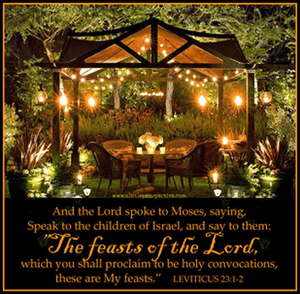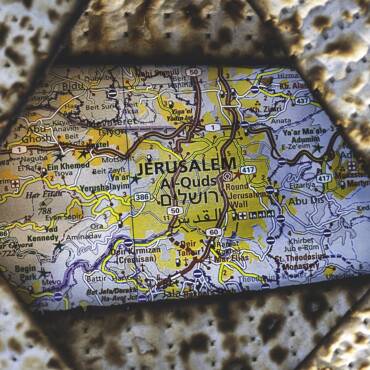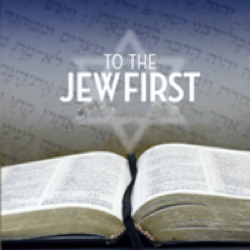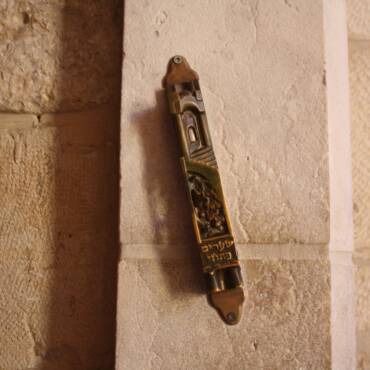Paul’s Festival Observances – Are they yours?

Are Paul’s Festival Observances Yours?
by Sam Nadler
When it comes to the annual festivals, it is largely assumed that these appointed times are a non-biblical issue for New Covenant believers, especially Gentile believers (non Jewish believers). This is a false assumption. In fact it is assumed these festivals are observanced by all Messianic believers in the New Covenant writings.
While traveling, Paul found himself in Philippi for HaMatzot (Days of Unleavened Bread – Leviticus 23:6). Therefore, he observed the Passover week there (Acts 20:6). Though this festival is not mentioned specifically in his letter to the Philippians, Paul faithfully observed Pesach. Evidently so did all to whom this record was addressed. It wasn’t mentioned in Paul’s letter to them. Not to indicate it wasn’t being observed, rather indicting it was being observed properly. As such, no letters needed to be written to them for ‘moral adjustments.’ In contrast, the Corinthians, needed reminders to “keep the feast,” without any hypocrisy (1 Cor. 5:6-8).
Similarly, when writing to the Corinthians from Ephesus, Paul gave his upcoming travel schedule for the year (1 Cor. 16:1-9). Since he was staying in Ephesus, he would be there during Shavuot (Pentecost, 1 Cor. 16:8). Paul had planted this significant congregation and the Corinthian congregation in Asia Minor. In 1 Corinthians, Paul references Passover and First Fruits of Passover week (1 Cor. 5:6-8; 15:20-23). Though there’s no mention in his letter to them, the Ephesians obviously observed Shavuot, as did the Corinthians. Regarding all the congregations Paul planted, the most accurate assumption is they kept all the Biblical festivals, including Yom Kippur.
Yom Kippur? Yes, when recording the shipwreck of Paul in Acts 17, Luke gives a time marker for when it occurred. “The time of the Fast has already passed” (27:9). Readers of the ‘New Testament’ might overlook this phrase. Yom Kippur is also known as “the Fast (Isaiah 58).” Luke assumed every believer would recognize the reference (HaTsom in Hebrew). Had Luke written to American believers and noted the event had occurred around Labor Day, Americans would immediately get it. Likewise, all believers in the first century were expected to recognize “the Fast,” since it was being observed. Why? There’s a couple of reasons. First of all, since all of the biblical festivals outlined in Leviticus 23 were the markers of God’s redemptive plan, this would have included the Day of Atonement: Yeshua the Messiah is our atonement In Hebrews 9-10, the once a year Yom Kippur sacrifice is used as the backdrop of our once, for all, eternal sacrifice of Messiah. Every first century congregation under apostolic authority utilized the biblical festivals not only for worship, but also as an effective witness to the greater Jewish community around them. All the festivals given in Leviticus picture Yeshua as the Messiah of Israel. Since all understood their calling to reach the world for Messiah,“to the Jew first and also to the Gentile,” (Rom. 1:16) the festivals provided the perfect model.
Some may argue about Colossians 2:16-17. This passage appears to say these festival matters are no longer a consideration for New Covenant believers. On the contrary, they are shadows of Messiah. This objection continues that ‘once the person arrives, you no longer look to the shadow.” But this objection is a wrong understanding of Paul’s intention in his writings. There must be a reality of the shadow.
Paul is making application of what he had just taught in Colossians 2:8-15. We are complete in the incarnate Messiah (2:9-10). We are not to be captured by philosophy or tradition of men (2:8, secondary and external matters). All fleshliness is removed in Messiah and raised in Him (2:11-12). In His forgiveness, the penalty of Torah has been canceled against us (since He took our penalty for us) and made a display of His victory. Our freedom from condemnation is our victory in Messiah. Therefore we’re not to “judge” each other in regards to the very matters that testify of our victory in Messiah (i.e., food, drink, festival or a new moon, or a Sabbath day), “for they are (not ‘were’ or ‘mere’ in some translations) shadows of things to come and the substance is of the Messiah.” His point here is we should not major in the minors of judging and condemning other believers on how they keep these secondary matters, but keep them we should. For they are a witness of the primary matter, Messiah, and of the remaining good things to come! Secondary matters were especially useful to identify us as His people, but also were condemnable showing our sinfulness in the least of commandment, the less weighty matters of the Torah (Mat. 23:23). The secondary matters have a vital purpose as we believers live out the primary matters through them. We are to give liberty on secondary matters and not to judge, for our unity is in the primary matters. In all other matters, we are to have charity for one another.
So we see, the annual, monthly and weekly festivals are all redemptive signs which continue to point to Yeshua. The Shabbat as the rest which is fulfilled in Messiah (Matthew 11:28), evidenced through the festival redemption in Messiah (John 1:29, etc.), and the new moon as the renewal of our lives as fulfilled in Yeshua (Ephesians 4:23-24; Colossians 3:10-11).
Eating and drinking has value as it refers to Messiah as the substance of our nourishment for our lives. All the feasts have value as they point to Him as the redemption of our souls. Because of the anti=Jewish prejudices which have been the norm for much ‘Christian’ teaching since the apostles left the scene, these matters seem hard to grasp. For all followers of the Messiah, the question is: will you follow the teaching of the Scripture or the traditions of men? Will you accept the Word of God or the traditions that men substituted for the truth?



